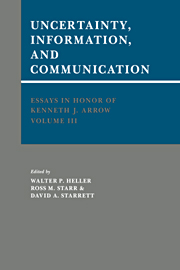Book contents
- Frontmatter
- Contents of Volumes I, II, III
- List of contributors
- Editors' preface
- Kenneth J. Arrow
- Contents
- PART I UNCERTAINTY
- 1 Negotiation in games: a theoretical overview
- 2 Repeated moral hazard with low discount rates
- 3 Existence, regularity, and constrained suboptimality of competitive allocations when the asset market is incomplete
- 4 Asset pricing theories
- 5 Independence versus dominance in personal probability axioms
- 6 Univariate and multivariate comparisons of risk aversion: a new approach
- PART II INFORMATION, COMMUNICATION, AND ORGANIZATION
- Publications of Kenneth J. Arrow
- Author index
1 - Negotiation in games: a theoretical overview
Published online by Cambridge University Press: 05 November 2011
- Frontmatter
- Contents of Volumes I, II, III
- List of contributors
- Editors' preface
- Kenneth J. Arrow
- Contents
- PART I UNCERTAINTY
- 1 Negotiation in games: a theoretical overview
- 2 Repeated moral hazard with low discount rates
- 3 Existence, regularity, and constrained suboptimality of competitive allocations when the asset market is incomplete
- 4 Asset pricing theories
- 5 Independence versus dominance in personal probability axioms
- 6 Univariate and multivariate comparisons of risk aversion: a new approach
- PART II INFORMATION, COMMUNICATION, AND ORGANIZATION
- Publications of Kenneth J. Arrow
- Author index
Summary
The perspective of cooperative game theory
This chapter offers a general perspective on what the methods of cooperative game theory can tell us about bargaining and negotiation between individuals who have different private information. The logical foundations and methodology of cooperative game theory may not be as clearcut as those of noncooperative game theory, but cooperative game theory does provide a conceptual structure that can give important insights into the practical problems of negotiation. In particular, the analysis of cooperative games with incomplete information can explain how regrettable (or ex post inefficient) outcomes, such as strikes, costly delays, and litigation, can occur in an efficiently designed social system, which older theories of cooperative games with complete information could not explain. This chapter surveys the basic ideas and results of the theory of cooperative games with incomplete information at a conceptual level, without getting deeply into the technical detail. For a more detailed and broader introduction to game theory, see Myerson (1985a, 1986b).
The fundamental principle of game theory is that any definite theory or social plan that predicts or prescribes behavior for all players in a game must designate a Nash equilibrium (or, more precisely, a sequentially rational Nash equilibrium), if this theory or plan is to be understood by all the players and is not to impute irrational behavior to any player at any point in time. [By “sequentially rational” we mean that the equilibrium should satisfy some conditions similar to those discussed by Kreps and Wilson (1982) or Myerson (1986a), or at least the subgame perfectness condition of Selten(1975).]
- Type
- Chapter
- Information
- Essays in Honor of Kenneth J. Arrow , pp. 3 - 24Publisher: Cambridge University PressPrint publication year: 1986
- 1
- Cited by



